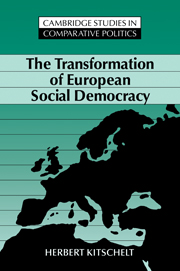Book contents
- Frontmatter
- Contents
- List of tables and figures
- Preface
- Glossary of political parties by country
- Introduction
- 1 Social structure and collective preference formation: Opportunities for left party strategy in the 1970s and 1980s
- 2 Class structure and left party performance
- 3 Political economy and left party fortunes
- 4 Social democratic strategy and electoral competition
- 5 Internal politics in socialist parties: Preference formation, aggregation, and strategic choice
- 6 The socialist discourse: Political semantics and party strategy
- 7 Social democracy in decline? Analytical and normative extensions of the argument
- References
- Index
6 - The socialist discourse: Political semantics and party strategy
Published online by Cambridge University Press: 08 January 2010
- Frontmatter
- Contents
- List of tables and figures
- Preface
- Glossary of political parties by country
- Introduction
- 1 Social structure and collective preference formation: Opportunities for left party strategy in the 1970s and 1980s
- 2 Class structure and left party performance
- 3 Political economy and left party fortunes
- 4 Social democratic strategy and electoral competition
- 5 Internal politics in socialist parties: Preference formation, aggregation, and strategic choice
- 6 The socialist discourse: Political semantics and party strategy
- 7 Social democracy in decline? Analytical and normative extensions of the argument
- References
- Index
Summary
In the preceding chapters I have shown that socialist parties' competitive strategies and their electoral payoffs can be explained primarily in terms of a logic of interests where actors strive to obtain given objectives (votes, office) in light of realistic beliefs about the constraints set by electoral institutions, the strategic moves of other parties and the voter distribution. Where parties do not follow this logic, organizational constraints on the competition among intraparty groups typically explain departures from vote- or office-seeking strategies. Nevertheless, organizational processes in socialist parties also involve a logic of ideas in which the recruitment or exit of party members and internal debates in light of a party's experience of crises in the electoral and the legislative arena bring about changes in the objectives and beliefs that guide a party's strategy.
In Chapter 5, I characterized the formal mechanisms of membership turnover and crisis debates according to which a logic of ideas influences party strategy, but I did not account for the substantive beliefs of activists who join and leave socialist parties and who engage in debates about responses to electoral decline. Why, for example, were “leftist” challengers of the dominant intraparty coalition in the Swedish social democrats or the British Labour Party inspired by a fairly orthodox economic Marxist socialism in the 1970s and the 1980s, whereas their counterparts in the Dutch Labor Party and the German Social Democrats increasingly subscribed to a strong cultural, ecological, communitarian, and libertarian discourse during the same time? The extent of each country's left-libertarian cleavage mobilization, by itself, explains these differences insufficiently.
- Type
- Chapter
- Information
- The Transformation of European Social Democracy , pp. 254 - 279Publisher: Cambridge University PressPrint publication year: 1994

